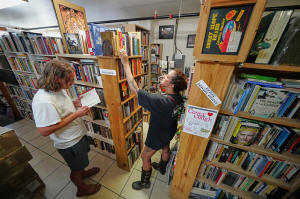From Stephen King to New Jersey diners, History Press books cover local
lore around the US
[August 09, 2025]
By HILLEL ITALIE
NEW YORK (AP) — With deep knowledge of Stephen King's books and
curiosity about their inspirations, writer Sharon Kitchens began a
journey around Maine. As she learned about the real-life settings and
people behind such fiction as “IT” and “Salem's Lot,” she arranged them
into an online map and story she called “Stephen King's Maine.”
“It was amateur hour, in a way,” she says. “But after around 27,000
people visited the site one of my friends said to me, ‘You should do
something more with this.’”
Published in 2024, the resulting book-length edition of “Stephen King's
Maine” is among hundreds released each year by The History Press. Now
part of Arcadia Publishing, the 20-year-old imprint is dedicated to
regional, statewide and locally focused works, found for sale in
bookstores, museums, hotels and other tourist destinations. The mission
of The History Press is to explore and unearth “the story of America,
one town or community at a time.”
The King book stands out if only for its focus on an international
celebrity. Most History Press releases arise out of more obscure
passions and expertise, whether Michael C. Gabriele's “The History of
Diners in New Jersey,” Thomas Dresser's “African Americans of Martha's
Vineyard” or Clem C. Pellett's “Murder on Montana's Hi-Line,” the
author's probe into the fatal shooting of his grandfather.

A home for history buffs
Like Kitchens, History Press authors tend to be regional or local
specialists — history lovers, academics, retirees and hobbyists.
Kitchens' background includes writing movie press releases, blogging for
the Portland Press Herald and contributing to the Huffington Post.
Pellett is a onetime surgeon who was so compelled by his grandfather's
murder that he switched careers and became a private investigator. In
Boulder, Colorado, Nancy K. Williams is a self-described “Western
history writer” whose books include “Buffalo Soldiers on the Colorado
Frontier” and “Haunted Hotels of Southern Colorado.”
The History Press publishes highly specific works such as Jerry
Harrington's tribute to a Pulitzer Prize-winning editor from the 1930s,
“Crusading Iowa Journalist Verne Marshall.” It also issues various
series, notably “Haunted” guides that publishing director Kate Jenkins
calls a “highly localized version” of the ghost story genre. History
Press has long recruited potential authors through a team of field
representatives, but now writers such as Kitchens are as likely to be
brought to the publisher's attention through a national network of
writers who have worked with it before.
“Our ideal author isn’t someone with national reach,” Jenkins says, “but
someone who’s a member of their community, whether that’s an ethnic
community or a local community, and is passionate about preserving that
community’s history. We’re the partners who help make that history
accessible to a wide audience.”
The History Press is a prolific, low-cost operation. The books tend to
be brief — under 200 pages — and illustrated with photos drawn from
local archives or taken by the authors themselves. The print runs are
small, and authors are usually paid through royalties from sales rather
than advances up front. History Press books rarely are major hits, but
they can still attract substantial attention for works tailored to
specific areas, and they tend to keep selling over time. Editions
selling 15,000 copies or more include “Long-Ago Stories of the Eastern
Cherokee,” by Lloyd Arneach, Alphonso Brown's “A Gullah Guide to
Charleston” and Gayle Soucek's “Marshall Field's,” a tribute to the
Chicago department store.
[to top of second column]
|

Andrew Higgins and Savannah Shealy peruse the biography section of
the Green Hand Bookstore in Portland, Maine, on Thursday, Aug. 7,
2025. (AP Photo/Robert F. Bukaty)
 The King guide, which has sold
around 8,500 copies so far, received an unexpected lift — an
endorsement by its subject, who was shown the book at Maine's
Bridgton Books and posted an Instagram of himself giving it a
thumbs-up.
“I was genuinely shocked in the best possible way,”
Kitchens says, adding that she saw the book as a kind of thank-you
note to King. “Every choice I made while writing the book, I made
with him in mind.”
Getting the story right
History Press authors say they like the chance to tell stories that
they believe haven’t been heard, or were told incorrectly.
Rory O'Neill Schmitt is an Arizona-based researcher, lecturer and
writer who feels her native New Orleans is often “portrayed in way
that feels false or highlights a touristy element,” like a
“caricature.” She has responded with such books as “The Haunted
Guide to New Orleans” and “Kate Chopin in New Orleans.”
Brianne Turczynski is a freelance writer and self-described
“perpetual seeker of the human condition” who lives outside of
Detroit and has an acknowledged obsession with “Poletown,” a Polish
ethnic community uprooted and dismantled in the 1980s after General
Motors decided to build a new plant there and successfully asserted
eminent domain. In 2021, The History Press released Turczynski's
“Detroit’s Lost Poletown: The Little Neighborhood That Touched a
Nation.”
“All of the journalist work that followed the story seemed to lack a
sense of closure for the people who suffered,” she said. “So my book
is a love letter to that community, an attempt for closure.”
Kitchens has followed her King book with the story of an unsolved
homicide, “The Murder of Dorothy Milliken, Cold Case in Maine.” One
of her early boosters, Michelle Souliere, is the owner of the Green
Hand Bookstore in Portland and herself a History Press writer. A
lifelong aficionado of Maine history, her publishing career, like
Kitchens', began with an online posting. She had been maintaining a
blog of local lore, “Strange Maine,” when The History Press
contacted her and suggested she expand her writing into a book.

“Strange Maine: True Tales from the Pine Tree State” was published
in 2010.
“My blog had been going for about 4 years, and had grown from brief
speculative and expressive posts to longer original research
articles,” she wrote in an email. “I often wonder how I did it at
all -- I wrote the book just as I was opening up the Green Hand
Bookshop. Madness!!! Or a lot of coffee. Or both!!!”
All contents © copyright 2025 Associated Press. All rights reserved |